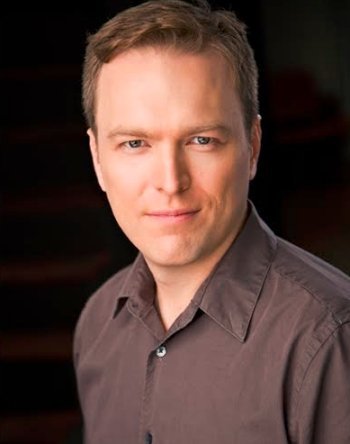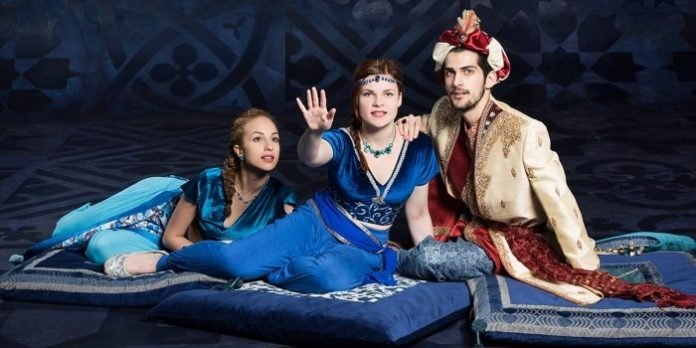University of British Columbia Master of Fine Arts candidate Evan Frayne directs Mary Zimmerman’s The Arabian Nights as his thesis project.
In this Q&A we find out more from Frayne about the upcoming production which runs at the Frederic Wood Theatre at the University of British Columbia from March 17 – April 2. Visit https://theatre.ubc.ca for tickets and information.
Q[/dropcap]Why The Arabian Nights as your thesis production for your MFA in Directing?
A lot of different factors went in to choosing The Arabian Nights for my thesis. I really looked at this opportunity, the MFA in Directing, as a chance to challenge myself and to explore plays, processes and ideas that I haven’t in the past. A friend of mine suggested I read the play and I was taken by it immediately. The chance to explore and to attempt to understand the diversity and depth of eastern cultures through their history of storytelling was something I just couldn’t pass up, particularly in a University setting. The idea that we can change the world through storytelling is a value that I believe in and one of the big reasons I am in theatre, and this piece speaks directly to that.
Q[/dropcap]What is it about the story of Scheherezade that still captures the imagination with people today?
It’s a survival story of the greatest imagination. Scheherezade is saving her life, and the life of her sister Dunyazade by telling stories. In a way she is also saving the soul of this man who is killing the women of his country so he can never be hurt again. Scheherezade is teaching him through these stories about how to open his heart to others, how not to vilify women and how to put the needs and wants of others first. She teaches him how to be a good and just king, husband and father. That’s a pretty powerful, relevant and enduring story if you ask me.
Q[/dropcap]What is the playwright trying to say?
Mary is just as interested in the “how” as she is about the “what”. Mary’s productions are highly theatrical extravaganzas of physical theatre, dance, music and text. She really is using as many different theatrical tools as she can to tell these stories in the most interesting way she can. So if you’re going to tackle her adaptations, you have to be willing to jump in to the theatrical world with both feet. What I also get is that she is trying to create a sense of wonder in her productions; to capture that sense of seeing and hearing a story for the first time with fresh eyes, like you would if you were a child. But I think Mary is trying to tell us about the essential nature of storytelling- not only is it important, it is essential in teaching us about the world and about ourselves.

Q[/dropcap]You’re directing a cast of sixteen in this production – is a cast of that size a blessing or a curse for a director?
It’s a blessing to have as many in the cast as we do for this production. There are so many elements to the production, physical theatre, music, dance, that it is a great luxury to say, “who has a moment to be a part of this dance” or “can someone help lift this actor here”. There are just so many moving pieces that some extra voices or hands are lovely to have. It certainly is a challenge to negotiate that many performers, but I really enjoy it. Reminds me of my hockey days, playing with a team and relying on your teammates to support and help when you need it.
Q[/dropcap]It is also a cast of students – do you approach your job as director any differently?
Yes, I think I have a responsibility to teach as much as I can about the practice of being an actor when working with the students. I have enough experience that I can give them an inside track on professional behavior, protocol, and some of the challenges of being a pro. I also really want them to have a sense of ownership over their performances- I think it’s really important that they engage with what we’re doing so I am less likely to flat out tell them how to do something- I want them to explore for themselves as much as possible.
Q[/dropcap]The costumes are all in shades of blue – what was it about that color that works so well with the play?
All the costumes except the king’s are in shades of blue. There are strong themes of day and night and the importance of sleep and rest. The stories are each told over the course of an evening or a series of evenings so we also considered that. Ultimately we wanted to create a design that was evocative of these cultures and stories that we are exploring and choosing a limited color pallet allowed us to explore some other design choices that we otherwise might not have considered.
Q[/dropcap]The cast also performs all of the original music from Andy Horka – why is the music important to the story?
It’s ultimately a storytelling piece and music/song, like poetry, is a great way to tell story in an accelerated or heightened way. We travel from Baghdad to India in the course of one song, we experience years of a relationship between a girl and a boy over the course of a couple of minutes because we can do it through song.
Q[/dropcap]You’ve been acting and directing for some time now before going back to get your MFA. Why did you decide to go back to school?
I’m very practical about my work and I wanted to get some more skills and explore some other processes as a director. I think it’s a natural progression to want to explore directing for an actor. I wanted to put my practice under a microscope, tear it apart and put it back together. It’s been a much different experience that I expected, but I have certainly learned a lot and, now, I feel like I can start with just about any text and have some where to start, which is all you can really ask for from any kind of training program. I have also learned a lot about the role of the actor and will take those lessons into my practice as I head back out into the professional world.
Q[/dropcap]Do you have a particular memory from your recent studies that will say with you?
Sitting in a cramped little office, surrounded by books about theatre talking with Kirsty Johnson and Selena Couture about representation and intercultural theatre. The academic side of my studies has been equal parts maddening and illuminating. I really think that those discussions will inform a lot of the choices moving forward in my career in terms of what I projects I pursue, why and how I articulate those impulses and values.
Q[/dropcap]What’s next after graduation?
I really miss acting. I’ll start auditioning again once the end comes around. The project based theatre company that I run called Bleeding Heart Theatre is producing a small production for the Fringe this September and we are are also producing and I will direct the world premiere of Sean Harris Oliver’s play, The Fighting Season which will be presented by the Cultch in January of 2017. I have some ideas for a new play which I’ll make some time for this summer. I’m doing a little bit of teaching post- MFA and maybe I’ll take a trip or two. Most likely you’ll find me in Tofino.

